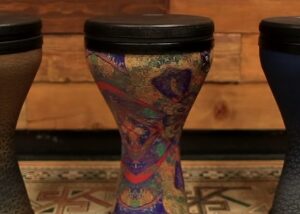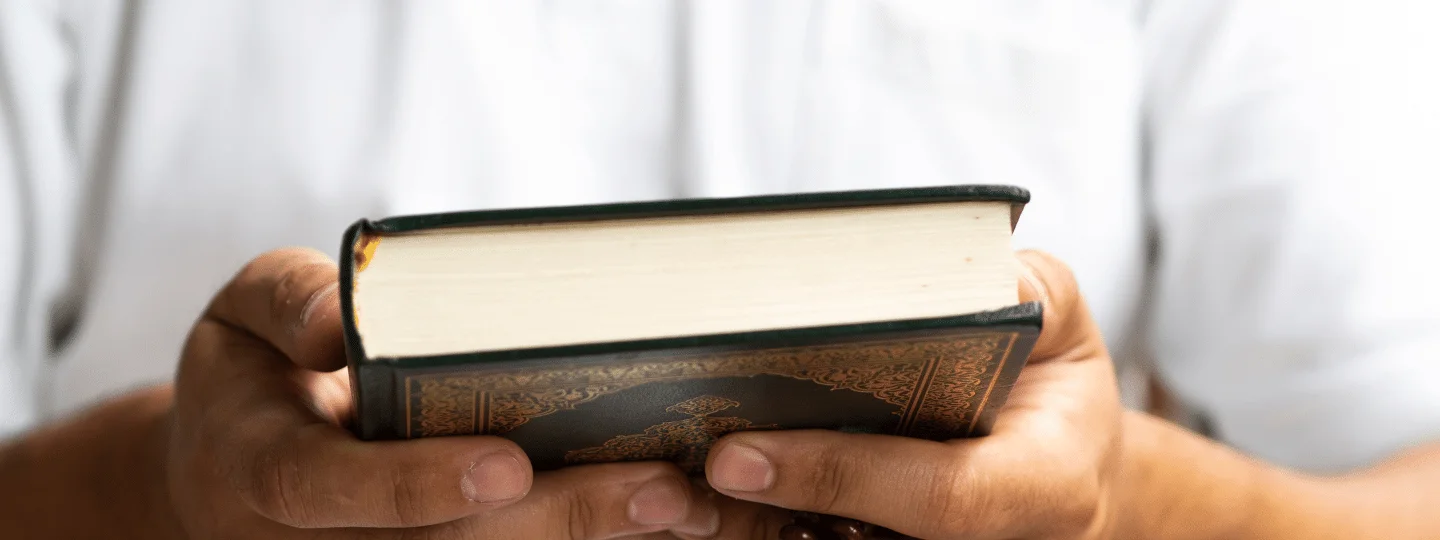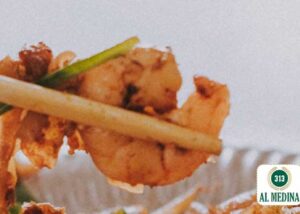Quran
Hadith
Islamic Text
Yes, the Daff (hand drum) is permitted in the Hanafi Madhab. Although there is a fair amount of difference with regards to the situations in which it is permitted. Some permitted on special occasions alone. Others said it is permitted for females but not for males.
عَنْ عَائِشَةَ: أَنَّ أَبَا بَكْرٍ رَضِيَ اللَّهُ عَنْهُ، دَخَلَ عَلَيْهَا، وَعِنْدَهَا جَارِيَتَانِ فِي أَيَّامِ مِنًى تُغَنِّيَانِ، وَتُدَفِّفَانِ، وَتَضْرِبَانِ، وَالنَّبِيُّ صَلَّى اللهُ عَلَيْهِ وَسَلَّمَ مُتَغَشٍّ بِثَوْبِهِ، فَانْتَهَرَهُمَا أَبُو بَكْرٍ، فَكَشَفَ النَّبِيُّ صَلَّى اللهُ عَلَيْهِ وَسَلَّمَ عَنْ وَجْهِهِ، فَقَالَ: دَعْهُمَا يَا أَبَا بَكْرٍ، فَإِنَّهَا أَيَّامُ عِيدٍ
(Sayidah) Aishah (May Allah Most High be pleased with her) narrated that Abu Bakr (May Allah Most High be pleased with him) entered upon me during the days of Mina. There were two young girls with me, singing and playing the Daff (hand drum), whilst the Prophet ﷺ was under his blanket. So Abu Bakr rebuked them. The Prophet uncovered his face and said, ‘Leave them O Abu Bakr, for indeed these are the days of Eid,’ (Sahih al-Bukhari, 3529).
In the Hadith above the Daff (hand drum) was being played in the presence of the Prophet ﷺ. Therefore, it establishes permissibility. So, the Duff or Daff is an exception to the general prohibition upon musical instruments. However, it does leave room for speculation with regards to the description of a Daff. Also, with regards to the circumstances in which the Daff is permitted.
وَقَالَ الْفُقَهَاءُ: الْمُرَادُ بِالدُّفِّ مَا لَا جَلَاجِلَ لَهُ
The jurists said, what is meant by the Duff is that which does not have cymbals (or the like). (Imam Ibn Humaam, Fath al-Qadeer).
وَقَالَ الْفُقَهَاءُ: الْمُرَادُ بِالدُّفِّ مَا لَا جَلَاجِلَ لَهُ. اهـ. وَفِي الْبَحْرِ عَنْ الذَّخِيرَةِ: ضَرْبُ الدُّفِّ فِي الْعُرْسِ مُخْتَلَفٌ فِيهِ وَكَذَا اخْتَلَفُوا فِي الْغِنَاءِ فِي الْعُرْسِ وَالْوَلِيمَةِ، فَمِنْهُمْ مَنْ قَالَ بِعَدَمِ كَرَاهَتِهِ كَضَرْبِ الدُّفِّ
The jurists said, what is meant by the Duff is that which does not have cymbals (or the like). In al-Bahr from al-Dhakheerah: Playing the Duff at a wedding is differed upon. Likewise there is a difference over singing at a wedding and Walimah. Some of them said it is not Makruh, like playing the Duff. (Imam Ibn Abideen, Radd al-Muhtaar).
In the Nusoos (texts) above, the position of the Hanafi Madhab regarding the description of a Daff is clarified. A Daff is a hand drum without symbols on the edge of the frame (Thus, a tambourine is not permitted). Even with regards to the Daff Imam Ibn Abideen has mentioned a difference of opinion. Some scholars considered it Makruh at a wedding and others did not. Imam Ibn Nujaym mentioned this too:
وَفِي الذَّخِيرَةِ ضَرْبُ الدُّفِّ فِي الْعُرْسِ مُخْتَلَفٌ فِيهِ، وَمَحَلُّهُ مَا لَا جَلَاجِلَ لَهُ أَمَّا مَا لَهُ جَلَاجِلُ فَمَكْرُوهٌ، وَكَذَا اخْتَلَفُوا فِي الْغِنَاءِ فِي الْعُرْسِ وَالْوَلِيمَةِ فَمِنْهُمْ مَنْ قَالَ: بِعَدَمِ كَرَاهَتِهِ كَضَرْبِ الدُّفِّ. اهـ
And in al-Dhakheerah (he said) playing the Duff at a wedding is differed upon. This is when there are no cymbals (or the like) on it. As for the Duff that has cymbals (or the like), then it is Makruh. Likewise they differed over singing at a wedding or meal. Some amongst them said it is not Makruh, like playing the Duff (is not Makruh). (Imam Ibn Nujaym, al-Bahr al-Raiq).
Some Hanafi scholars were of the opinion that it is permitted for women but not for men:
(قَوْلُهُ ضَرْبُ الدُّفِّ فِيهِ) جَوَازُ ضَرْبِ الدُّفِّ فِيهِ خَاصٌّ بِالنِّسَاءِ لِمَا فِي الْبَحْرِ عَنْ الْمِعْرَاجِ بَعْدَ ذِكْرِهِ أَنَّهُ مُبَاحٌ فِي النِّكَاحِ وَمَا فِي مَعْنَاهُ مِنْ حَادِثِ سُرُورٍ. قَالَ: وَهُوَ مَكْرُوهٌ لِلرِّجَالِ عَلَى كُلِّ حَالٍ لِلتَّشَبُّهِ بِالنِّسَاءِ
His saying: And playing a Duff in it (a wedding). The permissibility of playing the Duff is specific to women. This is due to what has been mentioned in al-Bahr from al-Miraaj, after mentioning that it is permitted at weddings and other similar events of joy, he said, it is Makruh for men in all cases, since it entails resembling women. (Imam Ibn Abideen, Radd al-Muhtaar).
Imam Ibn Abideen also mentioned an opinion that the Daff is completely prohibited, like the flute. However, he narrated this from al-Quhustani.
وَاسْتِمَاعُ ضَرْبِ الدُّفِّ وَالْمِزْمَارِ وَغَيْرِ ذَلِكَ حَرَامٌ وَإِنْ سَمِعَ بَغْتَةً يَكُونُ مَعْذُورًا وَيَجِبُ أَنْ يَجْتَهِدَ أَنْ لَا يَسْمَعَ قُهُسْتَانِيٌّ
Listening to the Duff, flute and other (instruments) is prohibited. If he hears it inadvertently, then he is excused. He must endeavour to avoid hearing it, al-Quhustani. (Imam Ibn Abideen, Radd al-Muhtaar).
As seen above there is a lot of Ikhtilaaf (difference of opinion), even within the Hanafi Madhab when it comes to the use of the Daff. Any person who decides to take a stricter approach and avoid the Daff is in a good position, since being cautious in religious issues is a praiseworthy trait. However, it does not give him the right to condemn those who are taking a more lenient approach. Rather we should accept the clear difference of opinion that exists within the Hanafi Madhab and also across the four Madhabs. Therefore it is not correct to rebuke those who play the Duff. Especially since there is clear evidence to support the position they have taken.
عَنْ مُحَمَّدِ بْنِ حَاطِبٍ الجُمَحِيِّ قَالَ: قَالَ رَسُولُ اللَّهِ صَلَّى اللَّهُ عَلَيْهِ وَسَلَّمَ: «فَصْلُ مَا بَيْنَ الحَرَامِ وَالحَلَالِ، الدُّفُّ وَالصَّوْتُ» وَفِي البَاب عَنْ عَائِشَةَ، وَجَابِرٍ، وَالرُّبَيِّعِ بِنْتِ مُعَوِّذٍ.: حَدِيثُ مُحَمَّدِ بْنِ حَاطِبٍ حَدِيثٌ حَسَنٌ
Muhammad bin Haatib al-Jumahi (May Allah Most High be pleased with him) said that the Messenger of Allah ﷺ said, ‘The distinction between the lawful and the unlawful is the Duff and the voice.’ (Tirmidhi 1088, Hasan).
And Allah Most High Knows Best
-Answered by Shaykh Noorud-deen Rashid (28.04.2022)
See also video:






